Men’s Hockey
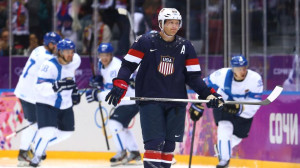 It seems those pesky Finns arrived in Sochi hell-bent on being giant slayers: after humiliating the mighty Russians by eliminating them from medal contention on Day 12 (3-1), they humiliated the even mightier Americans by denying them even a consolation bronze medal today (5-0).
It seems those pesky Finns arrived in Sochi hell-bent on being giant slayers: after humiliating the mighty Russians by eliminating them from medal contention on Day 12 (3-1), they humiliated the even mightier Americans by denying them even a consolation bronze medal today (5-0).
Surely, if any team can boast of having the best Olympics ever without winning a gold medal, it’s Finland’s Men’s Hockey team, no?
To be fair, though, I noted in my Day 8 commentary below that the Russians and Americans were acting as if their qualifying game was for the gold medal. It’s hardly surprising, therefore, that after winning that game, the Americans played as if no other mattered; or that after losing it, the Russians played the same way.
Women’s 4×6 Biathlon Relay
All of the media scaremongering before the Opening Ceremony about violence marring these Games pertained to the Damoclean prospect of Islamic radicals detonating bombs in Russia, if not in Sochi itself.
Thus far, however, the only violence of note has played out in the neighboring country of Ukraine, where pro-Russian and pro-Western Ukrainians have been locked in civil strife months.
In fact, one pro-Western Ukrainian athlete garnered her 15 minutes of fame by making quite a show of withdrawing from the Olympics in protest; never mind that her chances of winning any medal were nil.
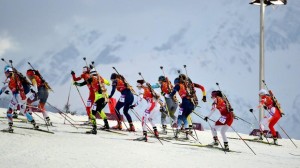 Indeed, by instructive contrast, her teammates on the Women’s 4x6km Biathlon Relay stayed; and they not only competed but paid the highest possible tribute to their country in the circumstances by winning gold yesterday. What’s more, the symbolism was not lost on anyone when political leaders back home struck a compromise on paper to avert all out civil war within hours after these female Olympians made them all so proud.
Indeed, by instructive contrast, her teammates on the Women’s 4x6km Biathlon Relay stayed; and they not only competed but paid the highest possible tribute to their country in the circumstances by winning gold yesterday. What’s more, the symbolism was not lost on anyone when political leaders back home struck a compromise on paper to avert all out civil war within hours after these female Olympians made them all so proud.
Great proof of how sport can unite the nation.
This was how Sergei Bubka, former Olympic champion in the Pole Vault and current leader of the Ukraine Olympic Committee, hailed the occasion.
But I’ve written many commentaries on the never-ending cycle of political turmoil and violence that has beset Ukraine ever since it broke away from the Soviet Union in 1991. And, unlike Bubka, I’m not at all sanguine that this admittedly glorious Olympic victory will have any lasting impact.
I’ll be addressing the latest on the Ukrainians, my favorite ex-communists, next week. (For the record, I’ve always felt that, if terrorists were going to strike Sochi, they would wait for the Paralympics when there would still be an unprecedented amount of international coverage, security would be more relaxed, and the psychological impact would be even greater.)
Speedskating: Payback’s a Bitch
One of the more interesting narratives of these Games involves two athletes who were effectively discarded by their home countries only to find Olympic glory competing for host country Russia.
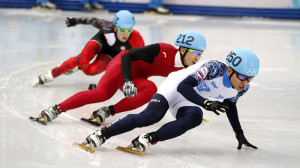 In my Day 8 commentary below, I hailed the sweet vindication Ahn Hyun-Soo of South Korea was experiencing as the only reason for commenting on short-track Speedskating, which I dismissed as little more than Roller Derby on ice.
In my Day 8 commentary below, I hailed the sweet vindication Ahn Hyun-Soo of South Korea was experiencing as the only reason for commenting on short-track Speedskating, which I dismissed as little more than Roller Derby on ice.
I wrote then that Hyun-Soo, who changed his first name to Viktor, must have had all of South Korea suffering pangs of regret after he won gold for Russia in the Men’s 1000. Well, the sports geniuses who decided Ahn was no longer good enough for South Korea must have handed in their resignations this morning. Because he only sweetened his vindication on the last day of competition in Speedskating yesterday by winning gold in the Men’s 500 and then leading his new Russian teammates to gold in the Men’s 5000 Relay.
Add to these gold-medal performances his bronze in the Men’s 1500 on Day 3, and it’s easy to understand why The Associated Press quoted Ahn saying, perhaps with unwitting double meaning, that these Olympic Games will be the best of his life. After all, his payback is all the more poignant given that his old South Korean teammates will be returning home without a single medal, of any kind.
Snowboarding: Payback’s a Bitch
 No less vindicating are the gold medals Vic Wild won in Men’s Parallel Giant Slalom on Day 12 and Men’s Parallel Slalom today. Ironically enough, like Ahn, he too found open arms and lots of support in Russia after leaving his home country, the United States, feeling unsupported and unappreciated.
No less vindicating are the gold medals Vic Wild won in Men’s Parallel Giant Slalom on Day 12 and Men’s Parallel Slalom today. Ironically enough, like Ahn, he too found open arms and lots of support in Russia after leaving his home country, the United States, feeling unsupported and unappreciated.
Never mind suspicions that Wild might’ve been the target of a good old-fashioned honey trap, given that he was lured to Russia with love from the beautiful Russian blonde he now calls his wife.
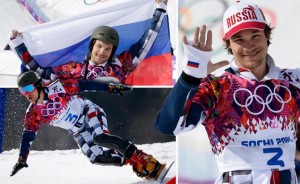 Except that, unlike the South Koreans, I doubt a single member of the selfie-obsessed Team USA is feeling any regret over his defection. But there’s no gainsaying the unbridled pride and schadenfreude Russians will feel if these two adopted sons help them dethrone the Americans as the reigning Olympic champions in the overall medal count. Such an outcome might make Wild an even more celebrated American defector than Edward Snowden.
Except that, unlike the South Koreans, I doubt a single member of the selfie-obsessed Team USA is feeling any regret over his defection. But there’s no gainsaying the unbridled pride and schadenfreude Russians will feel if these two adopted sons help them dethrone the Americans as the reigning Olympic champions in the overall medal count. Such an outcome might make Wild an even more celebrated American defector than Edward Snowden.
Indeed, no less a person than President Vladimir Putin telegraphed as much when, unable to resist poking Russia’s finger in the eye of the United States, he praised Wild, in vintage Cold-War rhetoric, as follows:
[You] withstood a fierce battle and formidable rivals… With your win, you have proved that the sports fate smiles on the most talented, driven and strongest in spirit.
(The Associated Press, February 22, 2014)
But, when you see Russia atop the overall medal count at the end of these Games, you should bear in mind that six of its medals (four of them gold) were won by athletes it adopted after their home countries discarded them.
The Most Accomplished/Decorated Athlete
I appreciate why the American media are hailing 18-year-old Mikaela Shiffrin as the most accomplished female athlete of these Games for winning just one gold medal in Alpine Skiing.
Except that I asserted in my Day 2 commentary below that Cross-Country Skiing is not only the most challenging sport to compete in but also the most exciting one to watch. Therefore, with all due respect to Shiffrin (and, more appropriately, to Viktor Ahn and Vic Wild), my choice for the most accomplished and most decorated athlete is one who competed in Cross Country.
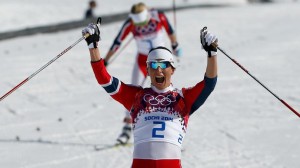 Frankly, the feats Marit Bjorgen of Norway performed were so extraordinary that denying her this acclaim would be like denying Michael Phelps the acclaim of being the most accomplished and most decorated athlete of the 2008 Beijing Olympics. After all, her gold today in the Women’s 30k was her third of these Games.
Frankly, the feats Marit Bjorgen of Norway performed were so extraordinary that denying her this acclaim would be like denying Michael Phelps the acclaim of being the most accomplished and most decorated athlete of the 2008 Beijing Olympics. After all, her gold today in the Women’s 30k was her third of these Games.
What’s more, her 10 Olympic medals, six of them gold, put her in a tie with Russian skier Raisa Smetamina, who competed over two decades ago, as the most decorated female Winter Olympian in history. It would seem that Bjorgen, at 33, has no choice but to settle for this shared acclaim, especially if, as she says, she wants to start a family. But this would be like Phelps settling for a tie with former Soviet Union gymnast Larisa Latynina as the most accomplished and most decorated Olympian of all time.
Granted, even if he wanted to start a family, Phelps wouldn’t have had to put his rigorous training on hold to do so. But, for inspiration and guidance, Bjorgen needs only look to women like Anna Chicherova of Russia – who won gold in Women’s High Jump at the 2012 London Olympics within two years after giving birth. Not to mention compelling evidence indicating that athletes competing in endurance events like Cross Country are just hitting their prime in their late-30s.
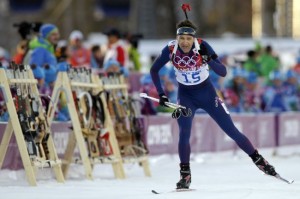 Apropos of which, Bjorgen could derive inspiration from her own teammate, Ole Bjoerndalen. After all, this 40 year old outclassed and outlasted men half his age to win gold in the Men’s Biathlon 10k at these Games on Day 1. And, with another gold in the Mixed Biathlon Relay on Day 12, he became the most decorated Winter Olympian in history with 13 medals.
Apropos of which, Bjorgen could derive inspiration from her own teammate, Ole Bjoerndalen. After all, this 40 year old outclassed and outlasted men half his age to win gold in the Men’s Biathlon 10k at these Games on Day 1. And, with another gold in the Mixed Biathlon Relay on Day 12, he became the most decorated Winter Olympian in history with 13 medals.
I duly heralded Bjoerndalen’s quest for Phelpsian glory in my Day 1 commentary below.
MEDAL COUNT
Russian: 29; United States: 27; Norway: 26